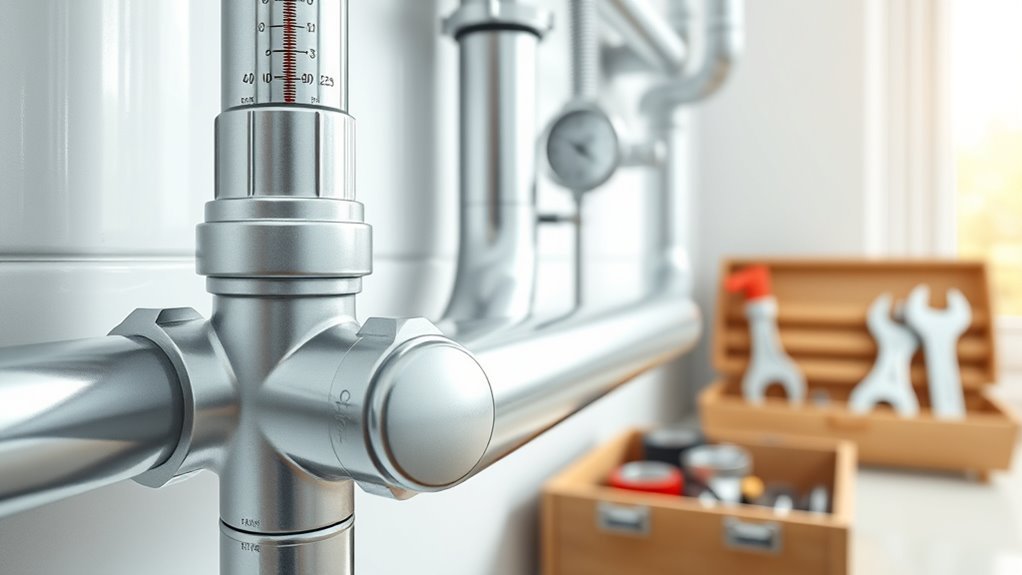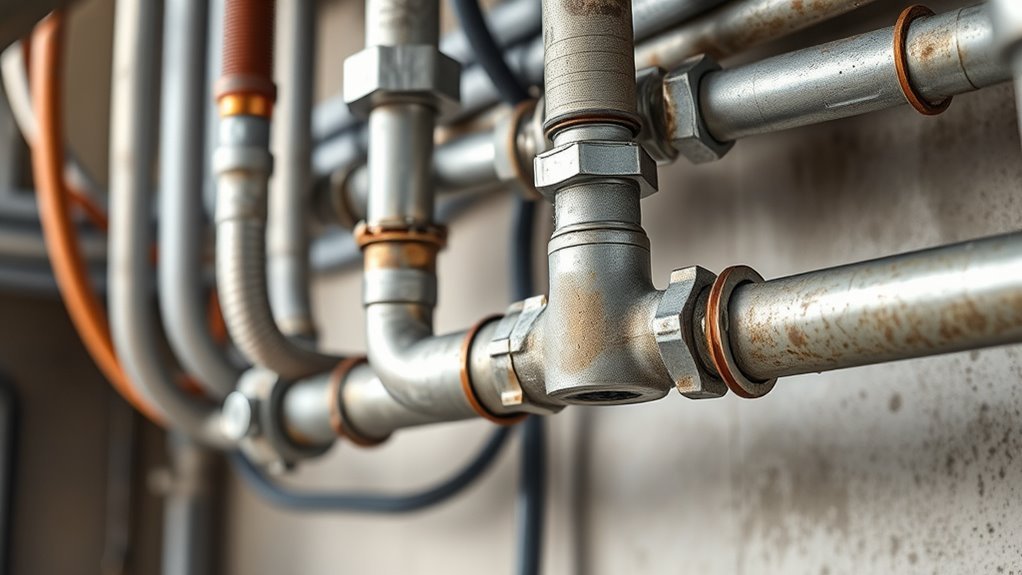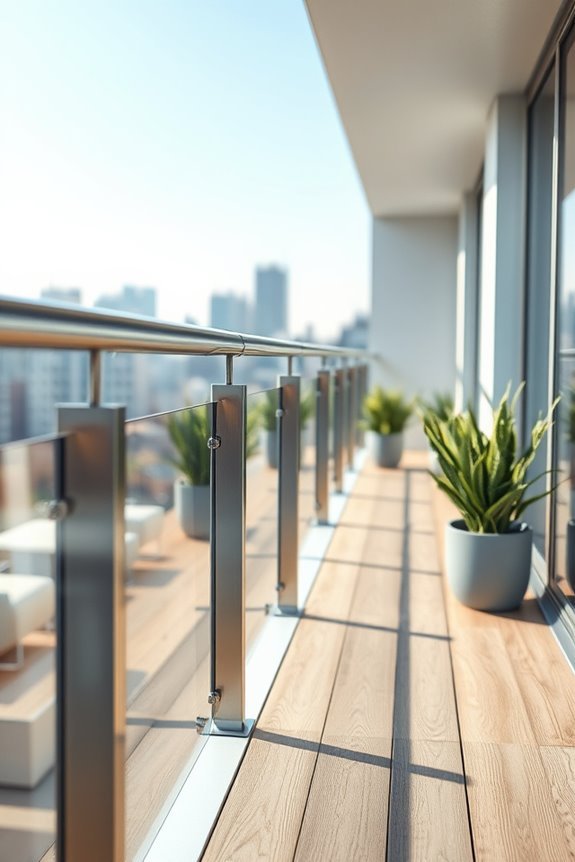Why Do Pipes Knock? Causes of Banging or Noisy Plumbing and Solutions
Pipes can make knocking sounds due to several common issues, including the water hammer effect, high water pressure, trapped air, loose fittings, and thermal expansion. To resolve these noises, consider installing water hammer arrestors, adjusting your water pressure, and securing any loose pipes. If you’re experiencing persistent issues, it may be beneficial to consult a plumbing professional for a thorough assessment.
Understanding Water Hammer Effect

If you’re experiencing loud banging noises in your plumbing, you might be dealing with the water hammer effect. This occurs when water flowing through pipes is suddenly stopped or redirected, creating shockwaves that cause vibrations and noise.
Common causes include high water pressure, fast-closing valves, and inadequate pipe support. Over time, this can lead to damage or leaks.
To resolve the issue, evaluate your plumbing system to identify the causes and implement necessary fixes for a quieter and more efficient operation.
Air Chambers and Their Role
Air chambers are crucial for reducing water hammer, a disruptive noise caused by sudden stops in water flow.
To ensure they function effectively, regular maintenance is necessary.
Function of Air Chambers
Air chambers are crucial in plumbing systems for reducing noise and preventing water hammer.
Positioned near fixtures, these chambers cushion water flow and absorb pressure fluctuations. When a tap closes suddenly, the rapid change in pressure can create loud banging noises, but air chambers compress trapped air to dissipate this energy.
They not only minimize noise but also protect pipes and fittings from damage. However, they can fill with water over time, losing their effectiveness.
Regular maintenance is essential to ensure they continue to function properly, maintaining a quiet and efficient plumbing system.
Maintenance Tips for Longevity
To ensure the longevity of your air chambers, regular maintenance is crucial. Here are key tips to keep them functioning effectively:
- Check for Sediment Buildup: Periodically inspect air chambers for any sediment accumulation. This can hinder performance and should be addressed promptly.
- Flush the System: Regularly flushing the system with water can help clear out debris and restore optimal functionality.
- Inspect for Leaks: Routinely check for any leaks or damage in the air chambers. Promptly fixing any issues can prevent further complications.
- Maintain Proper Water Pressure: Ensure that your water pressure is within the recommended range. Excessive pressure can strain air chambers, leading to noise and potential damage.
- Consider Professional Inspections: Schedule periodic professional inspections to ensure that your air chambers remain in top condition.
High Water Pressure Issues
High water pressure in your home can lead to noisy plumbing, with sounds like banging pipes becoming common.
When pressure exceeds the normal range of 60-80 psi, it not only creates vibrations and unsettling noises but also stresses your plumbing fixtures, increasing the risk of leaks and failures.
To solve this issue, consider installing a pressure regulator. This device maintains optimal pressure levels, reduces noise, and enhances the efficiency of your plumbing system.
If you’re experiencing these problems, taking action can ensure a quieter and more reliable home water system.
Loose Pipes and Mountings

Loose pipes and mountings in your plumbing can lead to disruptive noises, known as “water hammer,” caused by vibrating or moving pipes when water flows through them. This is especially noticeable at sharp turns or connections.
To prevent wear and tear, leaks, and further damage, check that your visible pipes and mountings are securely fastened. Using pipe straps or brackets can significantly reduce noise and improve the stability of your plumbing system, creating a quieter home environment.
Regular inspections are key to maintaining your plumbing’s integrity and minimizing disruptions.
Thermal Expansion of Pipes
Thermal expansion of pipes happens when water heats up, causing pipes to expand and contract. This can create noise as pipes move against their supports or other structures.
To reduce these sounds, consider the following mitigation techniques:
- Use Pipe Insulation: Insulating pipes can help minimize movement and noise.
- Secure Pipes: Ensure pipes are properly fastened to limit movement against supports.
- Expansion Joints: Install expansion joints to accommodate pipe movement and reduce stress.
- Flexible Supports: Use flexible hangers or supports that allow for some movement without noise.
Implementing these strategies can help maintain a quieter environment in your home.
Causes of Thermal Expansion
When water heats up in plumbing pipes, it expands, which can lead to pressure changes and noise. Understanding the causes of thermal expansion can help you manage these issues effectively:
- Temperature Fluctuations: Rapid temperature changes from hot to cold can cause significant expansion and contraction.
- Pipe Material: Different materials expand at varying rates; for example, metal pipes typically expand more than plastic ones.
- Insulation: Poorly insulated pipes may heat unevenly, worsening thermal expansion problems.
- Water Pressure: High water pressure can increase stress on pipes, amplifying noise from thermal expansion.
Mitigation Techniques for Noise
To reduce noise in plumbing systems caused by thermal expansion, consider these effective techniques:
- Install Pipe Insulation: This helps absorb vibrations and minimizes noise from expanding pipes.
- Use Brackets or Hangers: Secure pipes with brackets or hangers to prevent movement and reduce banging sounds.
- Employ Flexible Connectors: These accommodate pipe expansion while dampening noise.
- Modify Water Flow Rates: Adjusting flow rates can alleviate pressure changes that contribute to noise.
- Provide Space Between Pipes and Surfaces: Ensure pipes are not tightly fitted against walls or other surfaces to allow movement without generating noise.
Implementing these strategies can significantly enhance the sound quality of your plumbing system and create a quieter home environment.
Faulty Valves and Their Impact
The Importance of Addressing Faulty Valves in Your Plumbing System
Faulty valves can significantly disrupt your plumbing system, causing a range of issues that homeowners might not immediately recognize. Here’s how these components can impact your home:
- Increased Water Pressure: Leaky or stuck valves can cause fluctuations in water pressure, leading to potential damage.
- Water Hammer: When valves fail, they can create sudden changes in water flow, resulting in loud banging noises known as water hammer.
- Reduced Efficiency: Malfunctioning valves can decrease the efficiency of your plumbing system, resulting in wasted water and higher bills.
- Frequent Repairs: Ongoing valve issues can lead to repeated plumbing problems, increasing repair costs over time.
To maintain a smooth and quiet plumbing system, it’s crucial to address faulty valves as soon as possible.
This proactive approach can save you time and money in the long run.
Water Flow Changes and Sudden Stops

Faulty valves can cause pressure fluctuations and noticeable changes in water flow, leading to sudden starts and stops that create loud banging noises in your plumbing system.
This phenomenon, known as “water hammer,” occurs when the momentum of moving water is abruptly stopped, putting stress on pipes and joints, which can result in leaks or damage over time.
Air trapped in the system can worsen these issues, leading to inconsistent water delivery.
It’s essential for homeowners to address irregularities in water flow quickly to avoid costly repairs and ongoing noise disturbances.
If you’re experiencing these problems, consider consulting a plumbing professional for a thorough inspection and repair.
Pipe Material and Its Influence
The choice of pipe material in plumbing significantly impacts the noise level during water flow.
Copper, PVC, and galvanized steel each transmit sound differently. Understanding these characteristics can help you pinpoint the source of plumbing noise and explore effective solutions.
If you’re experiencing excessive noise, consider switching to a quieter material like PVC or using soundproofing techniques to mitigate vibrations.
Types of Pipe Materials
When choosing pipe materials for your plumbing system, it’s crucial to understand how each type affects performance and maintenance.
Here’s a breakdown of four popular pipe materials:
- PVC (Polyvinyl Chloride): This lightweight option is resistant to corrosion and ideal for many plumbing applications. However, be mindful that it can produce noise from vibrations.
- Copper: Known for its durability, copper pipes can last for decades. Keep in mind that they may expand with temperature changes, which can lead to noise.
- PEX (Cross-Linked Polyethylene): Flexible and resistant to scale buildup, PEX is often quieter than rigid pipes, making it a great choice for noise-sensitive areas.
- Galvanized Steel: While strong and reliable, galvanized steel pipes can rust over time and may contribute to noisy plumbing systems.
Vibration and Sound Transfer
When choosing plumbing pipe materials, consider how they affect vibration and sound transfer.
Metal pipes, such as copper and steel, transmit sound and vibrations more effectively, leading to a noisier plumbing experience.
In contrast, PEX pipes are flexible and can absorb vibrations, resulting in quieter operation.
Additionally, installation methods like using clamps and insulation can further reduce noise.
Plumbing System Age and Wear
As plumbing systems age, they often develop issues that can lead to noisy pipes.
If you’re hearing unusual sounds, it could be due to one of these common problems:
- Corroded Pipes: Rust and mineral buildup can restrict water flow and cause banging noises.
- Loose Fasteners: As pipes age, mounting brackets may loosen, resulting in vibrations.
- Worn-Out Valves: Old valves can malfunction, leading to water hammer and knocking sounds.
- Debris Accumulation: Sediment buildup can create blockages, increasing pressure and noise.
Addressing these issues promptly can help you maintain a quieter plumbing system.
If you’re experiencing these problems, consider consulting a professional plumber for an assessment.
Improperly Installed Plumbing
Improperly installed plumbing can cause annoying noises in your home due to issues like poor pipe support, incorrect sizing, and misaligned connections.
To ensure a quiet and efficient plumbing system, it’s important to address these installation problems promptly.
If you’re experiencing noise disturbances, consider consulting a plumbing professional to diagnose and fix these issues for improved comfort.
Poor Pipe Support
Poor pipe support can create unwanted noise in your plumbing system.
If you’re experiencing clanks and rattles, here are the key reasons and solutions:
- Insufficient Brackets: Ensure you have enough pipe supports to prevent sagging.
- Improper Spacing: Maintain proper spacing between pipes for stability.
- Deteriorating Materials: Check for rust or weakened supports that could cause loosening.
- Incorrect Installation: Look for misalignment that may create stress points and noise.
Incorrect Pipe Sizing
Incorrect pipe sizing can cause significant issues in your plumbing system, such as noisy water flow and inefficient performance. When pipes are mismatched to the system’s needs, it results in pressure imbalances that can create banging and vibrating sounds. Additionally, oversized pipes may hinder proper water flow, leading to inadequate supply.
Here are the main issues caused by incorrect pipe sizing:
| Issue | Description |
|---|---|
| Pressure Imbalance | Leads to noisy water flow |
| Inefficient Flow | Results in insufficient water supply |
| Increased Wear | Causes premature pipe damage |
To ensure a quiet and efficient plumbing system, it’s crucial to assess and install the correct pipe sizes.
Misaligned Connections
Misaligned connections in plumbing systems can cause significant issues for homeowners.
Here are the main problems to be aware of:
- Vibration: Improperly aligned pipes can rattle, leading to annoying noises.
- Leaks: Misalignments may create gaps, resulting in water leaks.
- Pressure Fluctuations: Poor connections can disrupt water flow, causing inconsistent water pressure.
- Increased Wear: Misalignment can lead to faster deterioration of pipes and fittings.
To maintain efficient plumbing and prevent costly repairs, address misalignments promptly.
Effects of Mineral Buildup
Mineral buildup in plumbing systems, while often overlooked, can lead to significant issues over time. It restricts water flow, causing pressure fluctuations that can result in noisy pipes and even lead to leaks and expensive repairs. Addressing this problem early can save homeowners from costly damage.
| Effect | Description | Solution |
|---|---|---|
| Reduced Water Flow | Buildup narrows pipe diameter | Regular descaling |
| Increased Pressure | Blockages cause water pressure spikes | Routine plumbing checks |
| Corrosion of Pipes | Minerals lead to rust and deterioration | Pipe replacement |
| Noisy Plumbing | Banging sounds from pressure changes | Install water hammer arresters |
| Fixture Damage | Mineral deposits can damage faucets and valves | Use water softeners |
To maintain a healthy plumbing system, consider implementing these solutions to prevent the adverse effects of mineral buildup.
Vibrations From Appliances
How to Reduce Noisy Plumbing from Appliance Vibrations
Vibrations from household appliances can lead to noisy plumbing, creating bothersome banging sounds throughout your home.
Here are common appliances that may be the source of these vibrations and how to address them:
- Washing Machines: Ensure loads are balanced to minimize shaking. Consider using anti-vibration pads.
- Dishwashers: Check for loose components that may rattle during cycles. Tighten any loose parts.
- Refrigerators: If the compressor is causing vibrations, try leveling the fridge or placing rubber pads underneath.
- Water Heaters: Sediment buildup can cause vibrations. Regular maintenance can help reduce resonance in pipes.
Seasonal Temperature Changes
Seasonal temperature changes can significantly affect plumbing systems, often resulting in unexpected noises. As temperatures shift, pipes may expand or contract, leading to sounds like banging, creaking, or thumping.
| Temperature Change | Potential Issue | Noise Type |
|---|---|---|
| Cold to Warm | Pipe expansion | Banging |
| Warm to Cold | Pipe contraction | Creaking |
| Rapid Fluctuations | Stress on joints | Thumping |
Understanding these effects can help homeowners identify the causes of noisy plumbing and address any issues effectively.
Solutions and Preventative Measures
If you’re dealing with noisy plumbing in your home, there are effective solutions and preventative measures you can take to create a quieter environment.
Here are some actionable strategies:
- Secure Loose Pipes: Fasten your pipes to the walls with pipe straps or brackets to minimize movement and vibrations that create knocking sounds.
- Install Water Hammer Arrestors: These devices can be added to your plumbing system to absorb shock and reduce banging noises when water flow stops abruptly.
- Adjust Water Pressure: Check your home’s water pressure and lower it if necessary to prevent excessive force that leads to noisy plumbing.
- Insulate Pipes: Insulating your pipes helps dampen sound and protects against temperature changes, significantly lowering noise levels.
When to Call a Professional
When should you contact a plumbing professional? Consider reaching out if you experience any of the following issues:
- Persistent knocking sounds: This may indicate air trapped in the pipes.
- Action: Call a plumber.
- Leaks or dampness: This can result from loose fittings or joints.
- Action: Schedule an inspection.
- Sudden drops in water pressure: This could signal blocked pipes.
- Action: Seek immediate help.
If DIY fixes aren’t working, or if you notice leaks, reduced water pressure, or changes in water quality, professional assistance is crucial to prevent further damage and costly repairs.
Conclusion
Banging pipes can be a frustrating issue for homeowners, often caused by factors like water hammer or loose mountings. To address these problems and restore peace in your home, consider implementing solutions such as securing loose pipes, installing water hammer arrestors, or adjusting water pressure. By understanding these causes and taking appropriate action, you can eliminate the noise and ensure your plumbing system operates efficiently.




